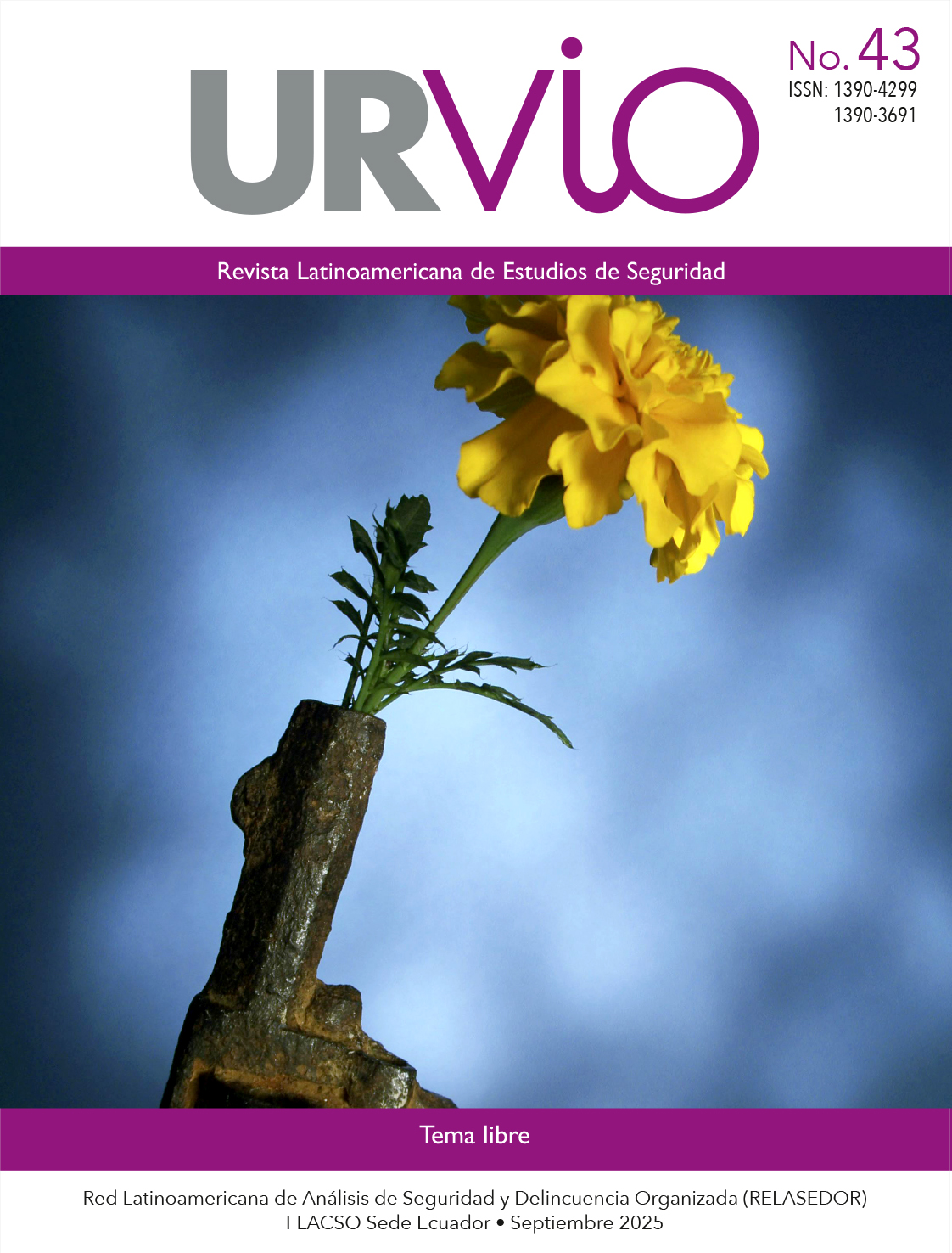Culture of Peace and Corruption: The Case of the State Anti-Corruption System in Michoacán, Mexico
Main Article Content
Abstract
Introduction: corruption erodes the culture of peace by weakening institutions, generating social distrust, and fostering impunity. Objective: in this context, this article analyzes the relationship between corruption and the culture of peace in Mexico, taking the state of Michoacán as a representative case, as it reflects common issues in other regions of the country affected by violence and insecurity. Methodology: the article employs a qualitative methodology based on interviews with key actors in Michoacán’s anti-corruption system, evaluating the regulatory and legal efforts to establish legal frameworks aimed at combating corruption. Conclusions: the study finds that Michoacán’s anti-corruption system faces challenges such as a lack of legislative support, fragmented political leadership, institutional fragmentation, and insufficient resources. It suggests the need for cultural transformation within institutions and greater citizen involvement to achieve an effective and lasting process in fighting corruption and building a culture of peace.
Downloads
Article Details

This work is licensed under a Creative Commons Attribution-NonCommercial-NoDerivatives 4.0 International License.

Urvio, Revista Latinoamericana de Estudios de Seguridad, operates under Creative Commons Attribution-No Derivative Work 3.0 unported (CC BY-ND 3.0).
The authors who publish in Urvio accept these terms:
You are free to share / copy and redistribute the material in any medium or format for any purpose, including commercial. Therefore, authors retain the copyright and cede to the journal the right of the first publication (CC by-ND 3.0), which allows third parties the redistribution, commercial or noncommercial, of what is published as long as the article circulates without changes.
The following conditions exist for the authors:
Recognition - you must recognize the authorship, provide a link to the license and indicate whether changes have been made. You can do this in any way reasonable, but not in a way that suggest that has the support of the licensor or receives it by the use he makes.
Without Derivative Work – If you remixed, transform or create a work from the original material, you cannot broadcast the modified material.
For more details, visit the page of Creative Commons (CC).
References
Acevedo Suárez, Aurymayerly, y Adriana Báez Pimiento. 2018. “La educación en cultura de paz: Herramienta de construcción de paz en el posconflicto”. Reflexión Política 20 (40): 68-80. https://bit.ly/403qDrO
Ahumada, Consuelo. 2020. “La implementación del Acuerdo de paz en Colombia: entre la “paz territorial” y la disputa por el territorio”. Problemas del desarrollo 51 (200): 25-47. Epub 09 de septiembre de 2020. https://doi.org/10.22201/iiec.20078951e.2020.200.69502
Alda Mejías, Sonia, y Gerardo Rodríguez Sánchez-Lara, coords. 2021. Seguridad, corrupción e impunidad en América Latina. Madrid: Instituto Elcano, Fundación Friedrich Naumann y Universidad de las Américas Puebla.
Arratia Sandoval, Esteban. 2017. “¿Rebeldes sin causa? Caballeros templarios y los límites de insurgencia criminal”. Si Somos Americanos, Revista de Estudios Transfronterizos 17 (2): 157-191. https://bit.ly/4fH972o
Bayce, Rafael. 2005. “La evolución sociocultural de la paz”. Ciências Sociais Unisinos 41(2): 121-131. https://www.redalyc.org/articulo.oa?id=93820813007.
Cabrera, Juan David. 2022. “Corrupción y paz”. Dejusticia, junio 15. https://www.dejusticia.org.
Camacho Beltrán, Enrique, y Francisco García González. 2019. “Cuando la corrupción es cultural: Explorando conceptos de corrupción morales, institucionales y basados en reglas.” Boletín Mexicano de Derecho Comparado 52 (155): 1325-1360.
Camacho Pérez, Jason Alexis, y Emilio Muñoz-Rivero Manrique. 2021. “Política Nacional Anticorrupción: Coordinación De políticas Y Retos Para Su implementación”. Estudios Políticos 53 (mayo). https://doi.org/10.22201/fcpys.24484903e.2021.53.79435.
Cortés Rodas, Francisco. 2010. “El contrato social liberal: John Locke”. Co-herencia 13: 99-132. https://www.redalyc.org/articulo.oa?id=77416997005.
Herrera, José, José Antonio Martínez, Felipe Tena y Jesús Arroyo. 2017. “Las constituciones políticas de Michoacán y sus reformas”. En Las Constituciones Políticas de Michoacán en el siglo XIX, editado por José Herrera y Jesús Arroyo, 402-405. Publicación independiente.
Instituto para la Economía y la Paz. 2024. Índice de Paz México 2024: Identificación y medición de los factores que impulsan la paz. Sídney: Instituto para la Economía y la Paz. https://www.visionofhumanity.org/resources/mpi-2024-wall-chart-spanish/**.
Instituto Nacional de Geografía, Informática y Estadística (INEGI). 2024. Encuesta Nacional de Victimización y Percepción sobre Seguridad Pública (ENVIPE) 2024. Aguascalientes: INEGI.
Jaramillo Marín, Jefferson. 2012. “Significado e impacto de la noción de contrato social en Rousseau y Kant. Alcances y limitaciones en la teoría democrática”. Civilizar. Ciencias Sociales y Humanas 12 (23): 111-123. https://www.redalyc.org/articulo.oa?id=100228405007.
Jované, Juan. 2018. “Corrupción, instituciones y economía política”. Tareas 160: 9-25. https://www.redalyc.org/articulo.oa?id=535058083004.
Luna, Iván. 2017. “El papel de los tratados internacionales en el Sistema Nacional Anticorrupción”. En ¿Cómo combatir la corrupción?, editado por Pedro Salazar, Francisco Ibarra e Imer Flores, 199-204. Ciudad de México: Universidad Nacional Autónoma de México. https://archivos.juridicas.unam.mx/www/bjv/libros/9/4315/27.pdf.
Mansilla, Hugo Celso Felipe. 2014. “Los dilemas del enfoque institucionalista en torno a la democracia contemporánea: un aporte a la historia de las ideas en la politología 1980-2000”. RIPS. Revista de Investigaciones Políticas y Sociológicas 13 (2): 9-30. https://www.redalyc.org/articulo.oa?id=38032972003.
Márquez, Daniel. 2018. “Reflexiones en torno a la reforma constitucional y legal en materia de combate a la corrupción en México”. Boletín Mexicano de Derecho Comparado 51 (152): 787-803. https://www.scielo.org.mx/scielo.php?script=sci_arttext&pid=S0041-86332018000200787.
Maldonado Aranda, Salvador. 2019. “Los retos de la seguridad en Michoacán”. Revista Mexicana de Sociología 81 (4): 737-763. https://www.redalyc.org/articulo.oa?id=32162693002.
Morales López, Julio Ulises. 2022. “Cuerpos jóvenes y control de territorios en el triángulo del huachicol”. Revista Latinoamericana de Ciencias Sociales, Niñez y Juventud 20 (3): 336-359. https://bit.ly/3ZYuyGy
Rodríguez Vásquez, María Eugenia. 2019. “Gobernanza, gobernabilidad y conflicto como conceptos en la construcción de paz”. Análisis. Revista Colombiana de Humanidades 51 (94): 101-119. https://bit.ly/41TATFN
Roque Huerta, Edith, y Héctor Antonio Emiliano Magallanes Ramírez, coords. 2024. Cultura de la paz, combate a la corrupción y el rol del compliance gubernamental. Valencia: Editorial Tirant Lo Blanch.
Tablante, Carlos, y Mariela Morales Antoniazzi, eds. 2018. Impacto de la corrupción en los derechos humanos. Querétaro: Instituto de Estudios Constitucionales del Estado de Querétaro.
Transparencia Internacional. 2023. Índice de Percepción de la Corrupción 2023. Berlín: Transparencia Internacional. http://bit.ly/40g94Gs
Valdés, Guillermo. 2013. Historia del narcotráfico en México. México: Aguilar.






